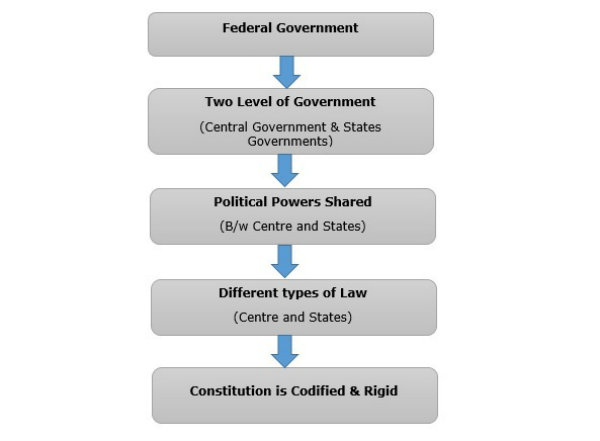
- Indian Polity - Home
- Indian Polity - Introduction
- Indian Polity - Constitution Formation
- Indian Polity - Constitution Features
- Guiding Values of the Constitution
- Indian Polity - Sources of Constitution
- Polity - How the Constitution Works
- Indian Polity - Union & Its Territory
- Indian Polity - Citizenship
- Indian Polity - Fundamental Rights
- Indian Polity - Directive Principles
- Indian Polity - Fundamental Duties
- Indian Polity - Union Executive
- Indian Polity - Union Legislature
- Indian Polity - Local Government
- Indian Polity - Judiciary
- Indian Polity - Federal System
- Indian Polity - Center State Relation
- Indian Polity - Emergency Provision
- Indian Polity - Elections System
- Indian Polity - Political Parties
- Constitutional Amendments
- Indian - Constitutional Schedules
- Indian Polity - Separation of Powers
- Indian Polity - Parts of Constitution
- Polity - International Organizations
- Indian Polity - Environment & Politics
- Indian Polity - Globalization
- Indian Polity - Popular Movements
- Indian Polity - Foreign Policy
Indian Polity - Federal System
Introduction
Federalism is an institutional mechanism to accommodate two sets of polities, i.e., first is the center or national level and second is at the provincial or regional level. Both the sets of polities are autonomous in its own sphere.
Each level of the polity has distinct powers and responsibilities and has a separate system of government.
The details of this federalism or dual system of government are generally found in a written constitution.
Written Constitution is considered to be supreme and also the source of the power of both sets of government.
Certain subjects, which are the concern of a nation as a whole, for example, defense or currency, are the responsibility of the union or central government.
On the other hand, regional or local matters are the responsibility of the regional or state government.
In case of a conflict between the center and the state on any issue, the judiciary has the powers to resolve the disputes.
Though the Indian Constitution does not use the word federalism anywhere; however, the structure of Indian government is divided into two sets of governments i.e.
For the entire nation known as the Union Government (or central government) and
For each unit or state known as the State Government.
The following diagram illustrates the basic structure of Federal System −

Subjects of Federal System
The Constitution clearly demarcates subjects, which are under the exclusive domain of the Union and those under the exclusive of States.
Likewise, the Constitution describes three lists −
Union List (subjects dealt by only Central Government);
State List (subjects dealt normally by States only); and
Concurrent List (both Union and State have the power to legislate these subjects).
Union List
- Subjects of Union List are −
- Defense
- Atomic Energy
- Foreign Affairs
- War and Peace
- Banking
- Railways
- Post and Telegraph
- Airways
- Ports
- Foreign Trade
- Currency & Coinage
State List
- Subjects of State Lists are −
- Agriculture
- Police
- Prison
- Local Government
- Public Heath
- Land
- Liquor
- Trade and Commerce
- Livestock and Animal Husbandry
- State Public Services
Concurrent List
- Subjects of Concurrent Lists are −
- Education
- Transfer of Property other than Agricultural land
- Forests
- Trade Unions
- Adulteration
- Adoption and Succession
Other Facts
Article 257 of the Constitution is read as: The executive power of every State shall be so exercised as not to impede or prejudice the exercise of the executive power of the Union, and the executive power of the Union shall extend to the giving of such directions to a State as may appear to the Government of India to be necessary for that purpose.
The Sarkaria Commission was appointed by the central government in 1983 to examine the issues relating to center-State relations; the Commission submitted its report in 1988 and recommended that appointments of Governors should be strictly non-partisan.
In 1953, the States Reorganization Commission was set up and it recommended the creation of linguistic States, at least for the major linguistic groups.
Resultantly, Gujarat and Maharashtra were created in 1960 and the process is still going on.
The Constitution of India (under Article 371) has given some special provisions for some States after considering their peculiar social and historical circumstances. However, most of the special provisions are related to the north eastern States (i.e. Assam, Nagaland, Arunachal Pradesh, Mizoram, etc.) largely due to a sizeable indigenous tribal population with a distinct history and culture.
Under Article 370 of the Constitution, the northern most state Jammu and Kashmir has also special provisions.
One of the major differences between the other States and the State of J&K are that no emergency due to internal disturbances can be declared in J&K without the concurrence of the State.
The Union Government cannot impose a financial emergency in J&K and the Directive Principles also do not apply in J&K.
An amendment to the Indian Constitution (under Art. 368) can only apply in concurrence with the government of J&K.